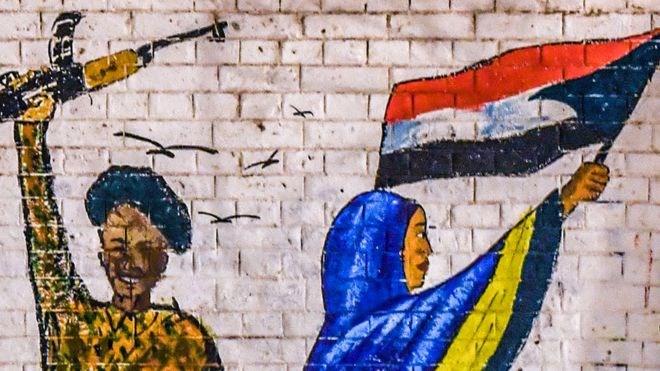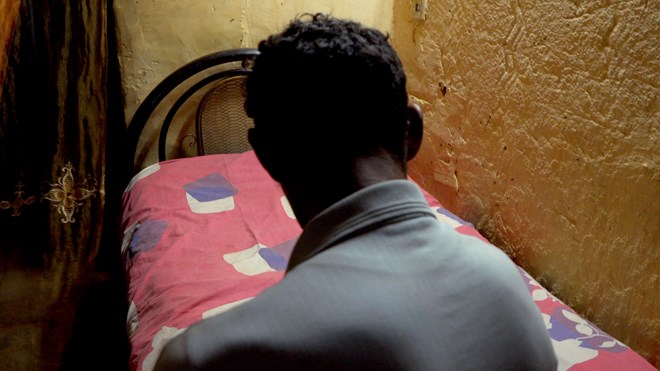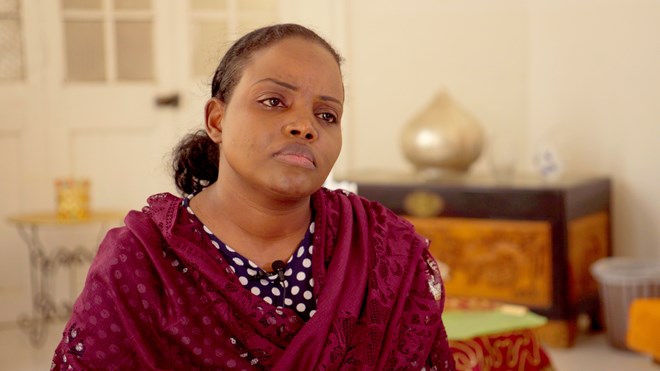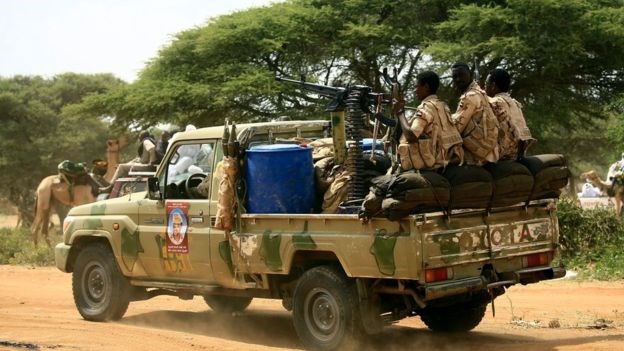
Saturday June 15, 2019
By Catherine Byaruhanga BBC Africa, Khartoum

A feared unit of Sudan's security forces raped women as they dispersed pro-democracy protesters camped outside the military's headquarters 12 days ago, witnesses have told the BBC.
The military authorities deny the allegations, but Khalid, whose name has been changed to protect his identity, told the BBC about the sexual assaults he saw on the day of the brutal crackdown.
When the shooting began shortly after the morning Muslim prayers he ran for cover with another protester to a nearby building. But as the two terrified young men hid in a room on an upper floor from the chaos outside, they heard screaming and crept out to peer down the stairwell to see what was going on.
"We saw six soldiers that were raping two girls," he told the BBC.
Khalid and his friend tried to intervene, shouting "go away, go away" at the armed men, part of the Rapid Support Force (RSF), more popularly known as the Janjaweed, who responded by shooting towards them.
'He tried to rape me'
When the pair eventually managed to make it down the stairs, the fighters had gone and they found the two distraught women.
All four of them had been amongst the vast crowds staging the sit-in outside the military headquarters in the capital, Khartoum, which stretched into the campus of University of Khartoum and north to the River Nile.
The mass protests led to the coup which saw Omar al-Bashir ousted as president after nearly 30 years in power at the beginning of April - and the demonstrators had maintained their vigil to see a return to civilian rule.
"The girls didn't say anything. They were just crying and screaming, crying and screaming, crying and screaming. I was trying to calm them," says Khalid.
"I tried to make them feel better, but they didn't stop screaming."
They decided to take the women to a mosque where they would be safer and cared for - and two men then tried to see if they could escape from the area, where teargassing and shootings continued.
As they left the mosque Khalid was captured by a group of Janjaweed and eventually found himself confronting one of the six who had earlier raped the women.
"He pushed me to the floor and brought out a long piece of steel," says Khalid, explaining that he was back in the building where the other rapes had occurred, in an upstairs office.
The BBC's Fergal Keane spoke to some of those who witnessed the violence
"They were trying to take off my clothes and were trying to rape me. I was screaming all around to get anyone to come.
"After like three or four minutes gunshots started under us. They looked around the office and said, 'It's better for us to get out.'"
Khalid then made a run for it - and managed to escape although he was beaten up by the Janjaweed several times on his way home.
'False stories to mislead the world'
It has been difficult to get a complete picture of the alleged atrocities that occurred when the thousands of Janjaweed fighters descended on the protesters as the internet has been cut off - and people have been scared to speak out.

According to the opposition, more than 100 people died in the crackdown - 40 of whom were thrown into the Nile.
It is not known how many people were raped - there have been rumours that it was widespread and has continued as the Janjaweed, who came to prominence for committing alleged atrocities in Darfur, Blue Nile State and the Nuba mountains, patrol the city.
The Transitional Military Council, which has now acknowledged that it ordered the crackdown, has denied the allegations of sexual violence.
"The false information that's being spread to our people and the rest of the world is designed to mislead them," said spokesman Lt Gen Shams el-Din Kabashi.
Another witness, an ambulance driver who asked not to be identified, told the BBC that he saw fighters argue over who would get to rape a woman.
She was being carried by medics towards his ambulance when soldiers began to fight over her: "They were feeling her up, they were arguing over who gets her."
Afterwards when the armed men had left, he and his colleagues rushed to help the woman and discovered that she was dead.
"We found out that the girl had been dead from the start. But they still didn't let her be."
'A weapon to kill the revolution'
For Sulaima Ishaq Sharif, who heads a trauma centre at Afhad University, these testimonies are not a surprise.

She says she and her colleagues are treating 12 women raped on 3 June, making home visits or speaking to them on the phone, and she believes the number of victims is likely to be higher as many rapes have not been reported because of the shame associated with it and the fear of being stigmatised.
For the mental health worker, the crackdown bears all the hallmarks of the Janjaweed: "I went to the sit-in area after two days because there were so many people missing. Some of the tents still had smoke coming from beneath them.
"Everything was destroyed - it's the same thing when you pass by villages in Darfur where they have shot and killed people and looted property, it's the same picture."

The RSF, known as the Janjaweed, have been active in Darfur for years/AFP
With regard to the rapes, Ms Sharif believes it is not about the sex: "It's all about degradation, humiliation and beating of the spirit. This is part of what they did in Darfur - they did it as a means, a weapon of war.
"Now it is a weapon to kill the revolution."
Khalid agrees that psychological injuries are harder to overcome than physical ones.
"Even at home I scream, I cry alone," he says, adding that counselling is not an option when the Janjaweed continue to fill the streets.
"Whenever you see them, you get back all the memories of every single thing you've seen of them."
But he says it is important for people to speak about what they have seen: "The whole world has to know what really happened there. Not the things the military says. The truth."